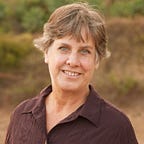Emotional Growth: The Grace of Being
A great gift of free will is the invisible but real satisfaction springing from carving out a life defined by one’s own values. Each of us has the capacity to choose independently, and to learn from the consequences of those choices so that we may add cumulatively to the store of our knowledge. While the process shows up more frequently as a caterpillar munching on leaves rather than a butterfly flitting delicately in a sunlit sky, every opportunity we find at a crossroads is practice in the art of living. We can grow up as much as we grow older. Conversely, when we avoid responsibility, we stagnate mentally and emotionally. As much as limiting the realm of infinite possibilities unfolding before us, choosing not to choose is also toxic to interpersonal relationships of all sorts — most particularly, those requiring the deepest intimacy.
Life is real. Life can be hard. Moments of peace and happiness come as respite and are to be treasured. These moments are fleeting because conflict, sorrow, pain, and turmoil are consistently around us. They come in a thousand different guises and can intrude even upon the most idyllic circumstances. “Happily ever after” is a cliche sold for entertainment. On the surface, it sounds great, but the reason the phrase gets used at the end of a story is because it really is the end. People who live happily ever after don’t struggle, don’t learn, and don’t grow.
Lucky us — we get to live through our decisions. Some decisions are easy. The consequences attached are light. Take picking chocolate over vanilla ice cream — the biggest fallout would be a quarrel with your taste buds. (Next time, you can choose the other flavor, and make things right.) Some decisions are more difficult, and some are flat-out painful. This happens when in the full range of available options, all are accompanied by mostly negative consequences. Alternatively, decisions made without instruction guides are also difficult and scary. We are left feeling our way through the dark, rocky terrain, relying on intuition to light the way when that is like operating a flashlight with dying batteries, flickering faultily.
Side note: Many thought leaders discuss personal development and dole out life advice. These conversations are interesting and can be stimulating and clarifying. However, I do not believe they substitute for living through experiences and building our emotional wheelhouses moment by moment. Words that we can’t internalize through emotional attachment exist only as hollow vessels, intellectualized schemas operating outside ourselves.
A decision means we pick a way forward from all the routes available. Then, we look back in the rearview mirror and see the scenery behind. Sometimes, we’re relieved to have moved from where we were, to where we are now. Sometimes, we’re faced with the irony of a transition not working out as originally planned, imploding our most cherished fantasies or leaving us loitering alone and out in left field. The irony of the latter is multiplied when we feel like our play is purely amateur, and nobody off the team cares that we’re stuck in an irrelevant position with the smell of grass and buzzing of a disturbed cloud of insects surrounding us.
Foolishness and wisdom follow one another. Anyone who has studied Tarot can attest to the symbiosis. The first card of Tarot deck, which in its entirety represents the journey — or journeys — undertaken through life, knows that the first card is The Fool. The Fool is often depicted as stepping off a cliff into the abyss of the unknown, a small bag of belongings behind him (symbolizing what he needs for the journey is carried along), and a dog companionably frolics nearby. Every journey undertaken begins with ignorance and culminates in experience. Then the cycle begins again with something new. This goes from hanging wallpaper for the first time, to raising a child for any time. What we learn — win, lose, or break even on the outside — is useful in evaluating future decisions.
In contrast, when we drift through life, refusing to own our actions and their consequences, our labors fail to bear fruit and cannot be harvested. We have to bring to the communal feast but pictures of an outward appearance. An example of this dynamic can be found in people high in narcissism and rigid in their characters. Narcissistic individuals wreak havoc in relationships, especially those deeper ones where emotional maturity is needed. The damage isn’t just confined to the relationships. Like any contagious ailment, the damage extends beyond in larger, concentric circles. The hurt that can be inflicted depends on a lot of factors but can be huge.
In conclusion, as morbid as the thought may be, we all live to die. The opportunities that come before that time, to grow our emotional bandwidths represent our true legacies. Yet the grace of our being need not be measured in terms of magnitude. Superheroes and ordinary folk alike, how we show up in our lives is how we impact. Every act, hidden or acknowledged, contributes to the whole of humanity. Each one matters. Each one forms us emotionally. Finally, like the Buddha said, “There isn’t enough darkness to snuff out the light of one little candle.” We choose whether we light the way forward.
# # #
